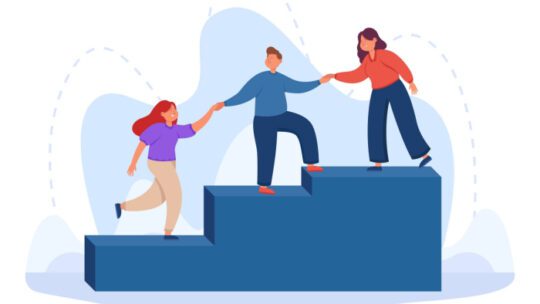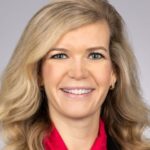
This past June, PRNEWS hosted its Top Women in PR Awards luncheon. Honorees took the stage to deliver remarks, with a number of themes quickly emerging, including the importance of mentorship, sponsorship and raising up the next generation.
In a virtual roundtable discussion to explore these topics in more detail, PRNEWS caught up with three of our honorees: Desiree Peterkin Bell, president & CEO, DPBell and Associates; Emily Browder, head of global communications, Merz Aesthetics; and Kim Menard, director, corporate communications, Airgas, an Air Liquide company.
The conversation was edited for length and clarity.
PRNEWS: Some of the themes that came out of the Top Women in PR Awards luncheon were the importance of mentorship, sponsorship and raising up the next generation. So I want to start by focusing on mentorship and sponsorship. Talk a bit about your approach.

Emily Browder: In being a mentor, it's very important to build a rapport first with a mentee. I...[try] to make [mentees] feel comfortable, to build a level of trust and respect and to create a safe space to share how they're feeling about something. Or, if they have a question, to make them feel like no question is too small to ask.
I think something else, informally, once you do have that trust and respect, is leading by example. I learned a lot early on in my career by listening and observing others that I respected and trusted, and used that as a way to learn.

Desiree Peterkin Bell: I try to challenge folks with the idea of mentorship, because there's work on both sides. I do not believe that mentorship is a paternalistic relationship, meaning one person, seemingly, in a higher role, teaching someone under them or treating them like they're under them. I think mentorship is a colleague-to-colleague relationship.
We have a number of young people who work for us, and I learn from them every single day...Mentorship is about two-way communication...and learning from each other.
And being honest with that relationship as well. I always tell my young folks who work with me to be humble, but to be clear; be direct, but be respectful.

Kim Menard: I think our role [as PR professionals] is so transversal and can support so many different parts of our organization in different ways. Being able to guide people through projects, or to work alongside them, gives me opportunity to mentor in different ways.
One thing we haven't talked about yet is how to figure through four generations working together. And I think the thing that has come up recently from my team is that the millennial vantage point respects and understands our most senior executives and our youngest executives.
[My company] has a kind of construct that we use, which is when we're talking about goal setting, we talk about one thing that [employees] want to work on, one thing that we need them to work on, and one thing that's mutually beneficial to both the company and [its employees]...And then the other part is trying out new skills and seeing if they like them, or if they thrive in them…So getting people to feel like they can try new things, and it's okay to learn and if they need to fail, they can fail in a safe way. It really, I think, builds up their confidence.
PRNEWS: There's two points there. We've been having conversations with many people about hiring those who maybe don't have that traditional communications experience or education, but are coming from other fields and bringing different perspectives. So how do you position people for success in a completely new kind of environment?
And there's also this idea that anyone coming out of college right now has never had to work in an office; they might not even know what it means to work in an office. There's learnings that can happen on both ends, so how has that impacted the way that you think about both mentorship and sponsorship these days?
Peterkin Bell: I think what's interesting for folks is to understand that there is no straight line in this industry for how you get to make impact, how you get involved, and what the job entails...
I mean, we look for specific skills. Number one is interest, energy, the ability to coherently put sentences together, the power of persuasiveness. And also the ability to learn quickly...
Menard: …I see people having less competence, or less experience, in professional interactions. They didn't get to practice that in a collegial environment…how to make small talk at a lunch.
Networking is another one that, after Covid shutdowns, our whole organization needed more opportunities with. We're having more networking style events, so that people can interact with each other, and learn about each other and find common ground and appreciate the variety of perspectives that we have.
Browder: Something else I've been thinking about lately, with this new dynamic of hybrid work over the last couple of years…is being very intentional about seeking out opportunities for people who are virtual employees. And thinking about how to still be sponsors and mentors and advocates for those people, even if they're not physically in the room. I think that takes a little bit more intentionality...
For the folks coming up in the next generation and recent college graduates, there's just such a difference in the amount of information that they can get from maybe 10-15 years ago. I mean, if you scroll through Instagram, the amount of reels with advice, and articles online…You don't have to physically learn from someone. I think that's very different and offers a unique perspective and opportunity...
PRNEWS: To your point about being more intentional, do you have a specific perspective on how to do that, especially in a hybrid or mostly virtual environment? How do you seek out opportunities for those that you want to sponsor?
And on the flip side, for those who are seeking opportunities to be sponsored, what can they do to be more visible when they're not face to face?
Browder: Something as simple as when we’re on calls and meetings where we have split attendees, some people on the phone, some people in the room, I always try to point to the people on the phone first to speak. That way they feel heard, and it's not a conversation in the room, and then an afterthought of the folks on the line…
And asking open-ended questions, and listening to what folks want to do, whether they're in person or virtual. That way you can understand their perspective, their career growth and trajectory, and how you can help support them…I think it's an ongoing struggle, but it's something that's top of mind for me.
Peterkin Bell: From a business perspective, I tend to be very open and honest about running a business, because it's not easy...
Covid hit us, and we made the choice to get rid of a lot of our brick and mortar. First, we did co-working spaces and then we realized that, for a lot of our associates who are all over the world…it's easier, at times, to just pull everyone together on a call. But the other reality was, to Emily's point, how do you continue to build community?
We are in a different reality than we were pre-Covid. There are lots of people who feel more comfortable working in a coffee shop or working in the corner of their house and I don't want to disrupt that, especially if they're still able to do the work and make the impact that we need to make…Once a quarter, we get everyone together, in person. And that's something that I do to also make sure that folks are connecting in person…Sometimes people need that connection.
We also make sure that the folks who are remote feel like they have access to everyone on the team. On Fridays, we typically have open office hours, where folks get to talk about everything. It doesn't have to be a project or client. We want folks to really talk about their work environments, what needs to change, what can make them more productive...
Browder: This is probably specific to my company, because we're a small, private family-owned company, but we also carve out time before our team meeting each week to just chat and catch up…So people working virtually still get that time to connect on a weekly basis versus, back when we were in the office, the kind of chat you might have going down the hall.
PRNEWS: For those who are just graduating or graduated in the last couple of years, and are still very junior, what advice would you have for them to make it known that they want these opportunities? I know that some people might feel shy asking for help, or for mentorship or sponsorship, or just don't even think about it because they've spent the last few years behind a screen. Is there anything that they should do, or say, or ask for?
Menard: I do see hesitation in asking others for help…
To Emily's point, you can DIY things based on what you see on YouTube. And you may not actually need to ask a human for help; you may ask Google for help… But you really, also, need to be able to help get perspective on things. I think that for someone coming out of school or entering the workforce, feeling comfortable asking questions when you are on the job is where I see people hesitating, where they don't have the ability to access Google to figure out how they would do it…
So help them see that it's appropriate and encouraged to bring their ideas to the table, but also to be open when they don't know how to do something…I think we've seen that happening more, where they're trying really hard to solve for themselves. They don't know that there's someone that can help them, or they aren't used to having help…
And I use the tool that's most comfortable for them to communicate. Some people love video chat… Others prefer just a regular simple chat…You have to be nimble; you can't use the tool that you prefer only.
PRNEWS: Is there anything else that you remember hearing from the awards program about pulling the next generation along?
Peterkin Bell: At my table, we had an amazing conversation… about generational relationships, how you build and learn from each other, whether you're millennial or Gen Z…
I fully agree with Kim saying, be uncomfortable. I try to tell folks who want to be mentored by me or by us…you can only grow when you're uncomfortable…younger folks have a tendency to really want to DIY. And I think that's very cool. But it should not preclude them from actually connecting with folks who have done the work before.
…Sometimes it's difficult, but I always leave folks with the following: Be humble but real, open and honest, be clear and direct.
Browder: I also think that encouraging folks to be inquisitive, to want to learn to approach things from that perspective, and soak it all in from others around them, is a good way to figure out how to get their feet on the ground in this new world …
And learning how to advocate for your work and raise your hand. Kim, you mentioned earlier about the importance of feeling comfortable to ask the question, but also throw out an idea. I remember early on in my career, I'd be sitting in meetings with people more senior than me and I would think something and a person would say it right after me. And there was this gap between thinking it and saying it and getting confident enough to speak up. So I think that encouraging people, if they're thinking it, say it; if they have a question, raise it.
Menard: A lot of people, myself included, take things personally when someone critiques their work. And that was probably the hardest thing for me when I started getting edits to everything I wrote. It can be daunting when it feels like it's all the time. I had the good fortune of having someone who…coached me through it, rather than told me I did everything wrong. So the approach of how you're receiving feedback, and being willing to take that feedback, is one that I don't think we've touched on.
…One of the ways that I see my role is to amplify other people's voices. I have a seat at the table, I have exposure, you can talk to me on the side, and I can advocate for [your idea]…One of my favorite things is when someone has a great idea that I get to propel.
And then the other piece, I think Desiree touched on, if you don't like where you're headed, you don't have to keep going that way. If you're in a position that isn't what you want to do next, then think it through and see where that pivot can lead you...
When you're starting out, you're like, "Okay, here are the rungs." And if you're interested in achieving things just for the sake of gold stars, you can want to keep going in that route. But at some point, it may or may not continue to serve you…
In PR, you have to be comfortable surfing chaos...You can take yourself down a ton of different avenues, but you need to be comfortable being uncomfortable.
